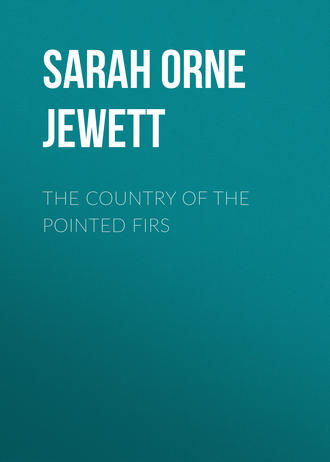 полная версия
полная версияThe Country of the Pointed Firs
“Oh dear me!” said Mrs. Fosdick.
“Joanna had done one thing very pretty. There was a little piece o’ swamp on the island where good rushes grew plenty, and she’d gathered ‘em, and braided some beautiful mats for the floor and a thick cushion for the long bunk. She’d showed a good deal of invention; you see there was a nice chance to pick up pieces o’ wood and boards that drove ashore, and she’d made good use o’ what she found. There wasn’t no clock, but she had a few dishes on a shelf, and flowers set about in shells fixed to the walls, so it did look sort of homelike, though so lonely and poor. I couldn’t keep the tears out o’ my eyes, I felt so sad. I said to myself, I must get mother to come over an’ see Joanna; the love in mother’s heart would warm her, an’ she might be able to advise.”
“Oh no, Joanna was dreadful stern,” said Mrs. Fosdick.
“We were all settin’ down very proper, but Joanna would keep stealin’ glances at me as if she was glad I come. She had but little to say; she was real polite an’ gentle, and yet forbiddin’. The minister found it hard,” confessed Mrs. Todd; “he got embarrassed, an’ when he put on his authority and asked her if she felt to enjoy religion in her present situation, an’ she replied that she must be excused from answerin’, I thought I should fly. She might have made it easier for him; after all, he was the minister and had taken some trouble to come out, though ‘twas kind of cold an’ unfeelin’ the way he inquired. I thought he might have seen the little old Bible a-layin’ on the shelf close by him, an’ I wished he knew enough to just lay his hand on it an’ read somethin’ kind an’ fatherly ‘stead of accusin’ her, an’ then given poor Joanna his blessin’ with the hope she might be led to comfort. He did offer prayer, but ‘twas all about hearin’ the voice o’ God out o’ the whirlwind; and I thought while he was goin’ on that anybody that had spent the long cold winter all alone out on Shell-heap Island knew a good deal more about those things than he did. I got so provoked I opened my eyes and stared right at him.
“She didn’t take no notice, she kep’ a nice respectful manner towards him, and when there come a pause she asked if he had any interest about the old Indian remains, and took down some queer stone gouges and hammers off of one of her shelves and showed them to him same’s if he was a boy. He remarked that he’d like to walk over an’ see the shell-heap; so she went right to the door and pointed him the way. I see then that she’d made her some kind o’ sandal-shoes out o’ the fine rushes to wear on her feet; she stepped light an’ nice in ‘em as shoes.”
Mrs. Fosdick leaned back in her rocking-chair and gave a heavy sigh.
“I didn’t move at first, but I’d held out just as long as I could,” said Mrs. Todd, whose voice trembled a little. “When Joanna returned from the door, an’ I could see that man’s stupid back departin’ among the wild rose bushes, I just ran to her an’ caught her in my arms. I wasn’t so big as I be now, and she was older than me, but I hugged her tight, just as if she was a child. ‘Oh, Joanna dear,’ I says, ‘won’t you come ashore an’ live ‘long o’ me at the Landin’, or go over to Green Island to mother’s when winter comes? Nobody shall trouble you an’ mother finds it hard bein’ alone. I can’t bear to leave you here’—and I burst right out crying. I’d had my own trials, young as I was, an’ she knew it. Oh, I did entreat her; yes, I entreated Joanna.”
“What did she say then?” asked Mrs. Fosdick, much moved.
“She looked the same way, sad an’ remote through it all,” said Mrs. Todd mournfully. “She took hold of my hand, and we sat down close together; ‘twas as if she turned round an’ made a child of me. ‘I haven’t got no right to live with folks no more,’ she said. ‘You must never ask me again, Almiry: I’ve done the only thing I could do, and I’ve made my choice. I feel a great comfort in your kindness, but I don’t deserve it. I have committed the unpardonable sin; you don’t understand,’ says she humbly. ‘I was in great wrath and trouble, and my thoughts was so wicked towards God that I can’t expect ever to be forgiven. I have come to know what it is to have patience, but I have lost my hope. You must tell those that ask how ‘tis with me,’ she said, ‘an’ tell them I want to be alone.’ I couldn’t speak; no, there wa’n’t anything I could say, she seemed so above everything common. I was a good deal younger then than I be now, and I got Nathan’s little coral pin out o’ my pocket and put it into her hand; and when she saw it and I told her where it come from, her face did really light up for a minute, sort of bright an’ pleasant. ‘Nathan an’ I was always good friends; I’m glad he don’t think hard of me,’ says she. ‘I want you to have it, Almiry, an’ wear it for love o’ both o’ us,’ and she handed it back to me. ‘You give my love to Nathan,—he’s a dear good man,’ she said; ‘an’ tell your mother, if I should be sick she mustn’t wish I could get well, but I want her to be the one to come.’ Then she seemed to have said all she wanted to, as if she was done with the world, and we sat there a few minutes longer together. It was real sweet and quiet except for a good many birds and the sea rollin’ up on the beach; but at last she rose, an’ I did too, and she kissed me and held my hand in hers a minute, as if to say good-by; then she turned and went right away out o’ the door and disappeared.
“The minister come back pretty soon, and I told him I was all ready, and we started down to the bo’t. He had picked up some round stones and things and was carrying them in his pocket-handkerchief; an’ he sat down amidships without making any question, and let me take the rudder an’ work the bo’t, an’ made no remarks for some time, until we sort of eased it off speaking of the weather, an’ subjects that arose as we skirted Black Island, where two or three families lived belongin’ to the parish. He preached next Sabbath as usual, somethin’ high soundin’ about the creation, and I couldn’t help thinkin’ he might never get no further; he seemed to know no remedies, but he had a great use of words.”
Mrs. Fosdick sighed again. “Hearin’ you tell about Joanna brings the time right back as if ‘twas yesterday,” she said. “Yes, she was one o’ them poor things that talked about the great sin; we don’t seem to hear nothing about the unpardonable sin now, but you may say ‘twas not uncommon then.”
“I expect that if it had been in these days, such a person would be plagued to death with idle folks,” continued Mrs. Todd, after a long pause. “As it was, nobody trespassed on her; all the folks about the bay respected her an’ her feelings; but as time wore on, after you left here, one after another ventured to make occasion to put somethin’ ashore for her if they went that way. I know mother used to go to see her sometimes, and send William over now and then with something fresh an’ nice from the farm. There is a point on the sheltered side where you can lay a boat close to shore an’ land anything safe on the turf out o’ reach o’ the water. There were one or two others, old folks, that she would see, and now an’ then she’d hail a passin’ boat an’ ask for somethin’; and mother got her to promise that she would make some sign to the Black Island folks if she wanted help. I never saw her myself to speak to after that day.”
“I expect nowadays, if such a thing happened, she’d have gone out West to her uncle’s folks or up to Massachusetts and had a change, an’ come home good as new. The world’s bigger an’ freer than it used to be,” urged Mrs. Fosdick.
“No,” said her friend. “‘Tis like bad eyesight, the mind of such a person: if your eyes don’t see right there may be a remedy, but there’s no kind of glasses to remedy the mind. No, Joanna was Joanna, and there she lays on her island where she lived and did her poor penance. She told mother the day she was dyin’ that she always used to want to be fetched inshore when it come to the last; but she’d thought it over, and desired to be laid on the island, if ‘twas thought right. So the funeral was out there, a Saturday afternoon in September. ‘Twas a pretty day, and there wa’n’t hardly a boat on the coast within twenty miles that didn’t head for Shell-heap cram-full o’ folks an’ all real respectful, same’s if she’d always stayed ashore and held her friends. Some went out o’ mere curiosity, I don’t doubt,—there’s always such to every funeral; but most had real feelin’, and went purpose to show it. She’d got most o’ the wild sparrows as tame as could be, livin’ out there so long among ‘em, and one flew right in and lit on the coffin an’ begun to sing while Mr. Dimmick was speakin’. He was put out by it, an’ acted as if he didn’t know whether to stop or go on. I may have been prejudiced, but I wa’n’t the only one thought the poor little bird done the best of the two.”
“What became o’ the man that treated her so, did you ever hear?” asked Mrs. Fosdick. “I know he lived up to Massachusetts for a while. Somebody who came from the same place told me that he was in trade there an’ doin’ very well, but that was years ago.”
“I never heard anything more than that; he went to the war in one o’ the early regiments. No, I never heard any more of him,” answered Mrs. Todd. “Joanna was another sort of person, and perhaps he showed good judgment in marryin’ somebody else, if only he’d behaved straight-forward and manly. He was a shifty-eyed, coaxin’ sort of man, that got what he wanted out o’ folks, an’ only gave when he wanted to buy, made friends easy and lost ‘em without knowin’ the difference. She’d had a piece o’ work tryin’ to make him walk accordin’ to her right ideas, but she’d have had too much variety ever to fall into a melancholy. Some is meant to be the Joannas in this world, an’ ‘twas her poor lot.”
XV. On Shell-heap Island
SOME TIME AFTER Mrs. Fosdick’s visit was over and we had returned to our former quietness, I was out sailing alone with Captain Bowden in his large boat. We were taking the crooked northeasterly channel seaward, and were well out from shore while it was still early in the afternoon. I found myself presently among some unfamiliar islands, and suddenly remembered the story of poor Joanna. There is something in the fact of a hermitage that cannot fail to touch the imagination; the recluses are a sad kindred, but they are never commonplace. Mrs. Todd had truly said that Joanna was like one of the saints in the desert; the loneliness of sorrow will forever keep alive their sad succession.
“Where is Shell-heap Island?” I asked eagerly.
“You see Shell-heap now, layin’ ‘way out beyond Black Island there,” answered the captain, pointing with outstretched arm as he stood, and holding the rudder with his knee.
“I should like very much to go there,” said I, and the captain, without comment, changed his course a little more to the eastward and let the reef out of his mainsail.
“I don’t know’s we can make an easy landin’ for ye,” he remarked doubtfully. “May get your feet wet; bad place to land. Trouble is I ought to have brought a tag-boat; but they clutch on to the water so, an’ I do love to sail free. This gre’t boat gets easy bothered with anything trailin’. ‘Tain’t breakin’ much on the meetin’-house ledges; guess I can fetch in to Shell-heap.”
“How long is it since Miss Joanna Todd died?” I asked, partly by way of explanation.
“Twenty-two years come September,” answered the captain, after reflection. “She died the same year as my oldest boy was born, an’ the town house was burnt over to the Port. I didn’t know but you merely wanted to hunt for some o’ them Indian relics. Long’s you want to see where Joanna lived—No, ‘tain’t breakin’ over the ledges; we’ll manage to fetch across the shoals somehow, ‘tis such a distance to go ‘way round, and tide’s a-risin’,” he ended hopefully, and we sailed steadily on, the captain speechless with intent watching of a difficult course, until the small island with its low whitish promontory lay in full view before us under the bright afternoon sun.
The month was August, and I had seen the color of the islands change from the fresh green of June to a sunburnt brown that made them look like stone, except where the dark green of the spruces and fir balsam kept the tint that even winter storms might deepen, but not fade. The few wind-bent trees on Shell-heap Island were mostly dead and gray, but there were some low-growing bushes, and a stripe of light green ran along just above the shore, which I knew to be wild morning-glories. As we came close I could see the high stone walls of a small square field, though there were no sheep left to assail it; and below, there was a little harbor-like cove where Captain Bowden was boldly running the great boat in to seek a landing-place. There was a crooked channel of deep water which led close up against the shore.
“There, you hold fast for’ard there, an’ wait for her to lift on the wave. You’ll make a good landin’ if you’re smart; right on the port-hand side!” the captain called excitedly; and I, standing ready with high ambition, seized my chance and leaped over to the grassy bank.
“I’m beat if I ain’t aground after all!” mourned the captain despondently.
But I could reach the bowsprit, and he pushed with the boat-hook, while the wind veered round a little as if on purpose and helped with the sail; so presently the boat was free and began to drift out from shore.
“Used to call this p’int Joanna’s wharf privilege, but ‘t has worn away in the weather since her time. I thought one or two bumps wouldn’t hurt us none,—paint’s got to be renewed, anyway,—but I never thought she’d tetch. I figured on shyin’ by,” the captain apologized. “She’s too gre’t a boat to handle well in here; but I used to sort of shy by in Joanna’s day, an’ cast a little somethin’ ashore—some apples or a couple o’ pears if I had ‘em—on the grass, where she’d be sure to see.”
I stood watching while Captain Bowden cleverly found his way back to deeper water. “You needn’t make no haste,” he called to me; “I’ll keep within call. Joanna lays right up there in the far corner o’ the field. There used to be a path led to the place. I always knew her well. I was out here to the funeral.”
I found the path; it was touching to discover that this lonely spot was not without its pilgrims. Later generations will know less and less of Joanna herself, but there are paths trodden to the shrines of solitude the world over,—the world cannot forget them, try as it may; the feet of the young find them out because of curiosity and dim foreboding; while the old bring hearts full of remembrance. This plain anchorite had been one of those whom sorrow made too lonely to brave the sight of men, too timid to front the simple world she knew, yet valiant enough to live alone with her poor insistent human nature and the calms and passions of the sea and sky.
The birds were flying all about the field; they fluttered up out of the grass at my feet as I walked along, so tame that I liked to think they kept some happy tradition from summer to summer of the safety of nests and good fellowship of mankind. Poor Joanna’s house was gone except the stones of its foundations, and there was little trace of her flower garden except a single faded sprig of much-enduring French pinks, which a great bee and a yellow butterfly were befriending together. I drank at the spring, and thought that now and then some one would follow me from the busy, hard-worked, and simple-thoughted countryside of the mainland, which lay dim and dreamlike in the August haze, as Joanna must have watched it many a day. There was the world, and here was she with eternity well begun. In the life of each of us, I said to myself, there is a place remote and islanded, and given to endless regret or secret happiness; we are each the uncompanioned hermit and recluse of an hour or a day; we understand our fellows of the cell to whatever age of history they may belong.
But as I stood alone on the island, in the sea-breeze, suddenly there came a sound of distant voices; gay voices and laughter from a pleasure-boat that was going seaward full of boys and girls. I knew, as if she had told me, that poor Joanna must have heard the like on many and many a summer afternoon, and must have welcomed the good cheer in spite of hopelessness and winter weather, and all the sorrow and disappointment in the world.
XVI. The Great Expedition
MRS. TODD never by any chance gave warning over night of her great projects and adventures by sea and land. She first came to an understanding with the primal forces of nature, and never trusted to any preliminary promise of good weather, but examined the day for herself in its infancy. Then, if the stars were propitious, and the wind blew from a quarter of good inheritance whence no surprises of sea-turns or southwest sultriness might be feared, long before I was fairly awake I used to hear a rustle and knocking like a great mouse in the walls, and an impatient tread on the steep garret stairs that led to Mrs. Todd’s chief place of storage. She went and came as if she had already started on her expedition with utmost haste and kept returning for something that was forgotten. When I appeared in quest of my breakfast, she would be absent-minded and sparing of speech, as if I had displeased her, and she was now, by main force of principle, holding herself back from altercation and strife of tongues.
These signs of a change became familiar to me in the course of time, and Mrs. Todd hardly noticed some plain proofs of divination one August morning when I said, without preface, that I had just seen the Beggs’ best chaise go by, and that we should have to take the grocery. Mrs. Todd was alert in a moment.
“There! I might have known!” she exclaimed. “It’s the 15th of August, when he goes and gets his money. He heired an annuity from an uncle o’ his on his mother’s side. I understood the uncle said none o’ Sam Begg’s wife’s folks should make free with it, so after Sam’s gone it’ll all be past an’ spent, like last summer. That’s what Sam prospers on now, if you can call it prosperin’. Yes, I might have known. ‘Tis the 15th o’ August with him, an’ he gener’ly stops to dinner with a cousin’s widow on the way home. Feb’uary n’ August is the times. Takes him ‘bout all day to go an’ come.”
I heard this explanation with interest. The tone of Mrs. Todd’s voice was complaining at the last.
“I like the grocery just as well as the chaise,” I hastened to say, referring to a long-bodied high wagon with a canopy-top, like an attenuated four-posted bedstead on wheels, in which we sometimes journeyed. “We can put things in behind—roots and flowers and raspberries, or anything you are going after—much better than if we had the chaise.”
Mrs. Todd looked stony and unwilling. “I counted upon the chaise,” she said, turning her back to me, and roughly pushing back all the quiet tumblers on the cupboard shelf as if they had been impertinent. “Yes, I desired the chaise for once. I ain’t goin’ berryin’ nor to fetch home no more wilted vegetation this year. Season’s about past, except for a poor few o’ late things,” she added in a milder tone. “I’m goin’ up country. No, I ain’t intendin’ to go berryin’. I’ve been plottin’ for it the past fortnight and hopin’ for a good day.”
“Would you like to have me go too?” I asked frankly, but not without a humble fear that I might have mistaken the purpose of this latest plan.
“Oh certain, dear!” answered my friend affectionately. “Oh no, I never thought o’ any one else for comp’ny, if it’s convenient for you, long’s poor mother ain’t come. I ain’t nothin’ like so handy with a conveyance as I be with a good bo’t. Comes o’ my early bringing-up. I expect we’ve got to make that great high wagon do. The tires want settin’ and ‘tis all loose-jointed, so I can hear it shackle the other side o’ the ridge. We’ll put the basket in front. I ain’t goin’ to have it bouncin’ an’ twirlin’ all the way. Why, I’ve been makin’ some nice hearts and rounds to carry.”
These were signs of high festivity, and my interest deepened moment by moment.
“I’ll go down to the Beggs’ and get the horse just as soon as I finish my breakfast,” said I. “Then we can start whenever you are ready.”
Mrs. Todd looked cloudy again. “I don’t know but you look nice enough to go just as you be,” she suggested doubtfully. “No, you wouldn’t want to wear that pretty blue dress o’ yourn ‘way up country. ‘Taint dusty now, but it may be comin’ home. No, I expect you’d rather not wear that and the other hat.”
“Oh yes. I shouldn’t think of wearing these clothes,” said I, with sudden illumination. “Why, if we’re going up country and are likely to see some of your friends, I’ll put on my blue dress, and you must wear your watch; I am not going at all if you mean to wear the big hat.”
“Now you’re behavin’ pretty,” responded Mrs. Todd, with a gay toss of her head and a cheerful smile, as she came across the room, bringing a saucerful of wild raspberries, a pretty piece of salvage from supper-time. “I was cast down when I see you come to breakfast. I didn’t think ‘twas just what you’d select to wear to the reunion, where you’re goin’ to meet everybody.”
“What reunion do you mean?” I asked, not without amazement. “Not the Bowden Family’s? I thought that was going to take place in September.”
“To-day’s the day. They sent word the middle o’ the week. I thought you might have heard of it. Yes, they changed the day. I been thinkin’ we’d talk it over, but you never can tell beforehand how it’s goin’ to be, and ‘taint worth while to wear a day all out before it comes.” Mrs. Todd gave no place to the pleasures of anticipation, but she spoke like the oracle that she was. “I wish mother was here to go,” she continued sadly. “I did look for her last night, and I couldn’t keep back the tears when the dark really fell and she wa’n’t here, she does so enjoy a great occasion. If William had a mite o’ snap an’ ambition, he’d take the lead at such a time. Mother likes variety, and there ain’t but a few nice opportunities ‘round here, an’ them she has to miss ‘less she contrives to get ashore to me. I do re’lly hate to go to the reunion without mother, an’ ‘tis a beautiful day; everybody’ll be asking where she is. Once she’d have got here anyway. Poor mother’s beginnin’ to feel her age.”
“Why, there’s your mother now!” I exclaimed with joy, I was so glad to see the dear old soul again. “I hear her voice at the gate.” But Mrs. Todd was out of the door before me.
There, sure enough, stood Mrs. Blackett, who must have left Green Island before daylight. She had climbed the steep road from the waterside so eagerly that she was out of breath, and was standing by the garden fence to rest. She held an old-fashioned brown wicker cap-basket in her hand, as if visiting were a thing of every day, and looked up at us as pleased and triumphant as a child.
“Oh, what a poor, plain garden! Hardly a flower in it except your bush o’ balm!” she said. “But you do keep your garden neat, Almiry. Are you both well, an’ goin’ up country with me?” She came a step or two closer to meet us, with quaint politeness and quite as delightful as if she were at home. She dropped a quick little curtsey before Mrs. Todd.
“There, mother, what a girl you be! I am so pleased! I was just bewailin’ you,” said the daughter, with unwonted feeling. “I was just bewailin’ you, I was so disappointed, an’ I kep’ myself awake a good piece o’ the night scoldin’ poor William. I watched for the boat till I was ready to shed tears yisterday, and when ‘twas comin’ dark I kep’ making errands out to the gate an’ down the road to see if you wa’n’t in the doldrums somewhere down the bay.”
“There was a head-wind, as you know,” said Mrs. Blackett, giving me the cap-basket, and holding my hand affectionately as we walked up the clean-swept path to the door. “I was partly ready to come, but dear William said I should be all tired out and might get cold, havin’ to beat all the way in. So we give it up, and set down and spent the evenin’ together. It was a little rough and windy outside, and I guess ‘twas better judgment; we went to bed very early and made a good start just at daylight. It’s been a lovely mornin’ on the water. William thought he’d better fetch across beyond Bird Rocks, rowin’ the greater part o’ the way; then we sailed from there right over to the landin’, makin’ only one tack. William’ll be in again for me to-morrow, so I can come back here an’ rest me over night, an’ go to meetin’ to-morrow, and have a nice, good visit.”
“She was just havin’ her breakfast,” said Mrs. Todd, who had listened eagerly to the long explanation without a word of disapproval, while her face shone more and more with joy. “You just sit right down an’ have a cup of tea and rest you while we make our preparations. Oh, I am so gratified to think you’ve come! Yes, she was just havin’ her breakfast, and we were speakin’ of you. Where’s William?”






